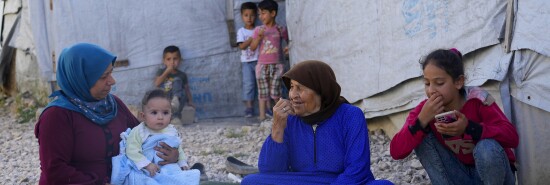
Assad wins at the United Nations Security Council — again
Daniel DePetris
The United Nations Security Council has generally been a feckless institution on the Syria file. The council’s ineptitude was exposed at the very start of the 12-year civil war. A body that was crafted out of the ashes of World War II to maintain international peace and security instead looked like a meaningless debating society, with Russia (often supported by China) on one side and the United States, Britain, and France on the other. Whenever the U.S. or its partners tried to present a resolution penalizing Syrian President Bashar Assad’s government, the Russians blocked it.
The one topic that was somewhat insulated from the council infighting was the provision of emergency relief supplies to vulnerable Syrians in non-government-controlled areas of the country. Washington and Moscow disagreed on pretty much everything with respect to Syria. However, ensuring millions of people didn’t starve to death or die from treatable diseases due to a lack of medicine was at least something the two could come together on. In 2014, the Security Council authorized U.N. agencies and humanitarian organizations to use four border crossings (two in Turkey, one in Iraq, and one in Jordan) to deliver humanitarian aid to Syrians who lived in opposition-held areas, whether Assad liked it or not.
SOME HOUSE GOP LAWMAKERS PUSH BIDEN IMPEACHMENT, BUT LEADERSHIP IS CAUTIOUS
Yet over the last several years, Russia has become increasingly exacerbated by the aid mechanism it originally agreed to. As Syrian government forces have retaken territory from the armed opposition — most of the country’s cities are now under Assad’s control — the Russians have argued that cross-border aid shipments are no longer appropriate. The Syrian government, Moscow says, can handle the aid shipments on its own — and to continue the status quo policy is to, in effect, violate Syria’s sovereignty and partner with jihadist groups that now run their own mini-state in Idlib province. The majority of the Security Council, often with the U.S. in the lead, has ridiculed that explanation. But all it takes is one permanent member to muck up the process or shut everything down.
In January 2020, Russia utilized its veto power to force a dramatic change in the U.N.’s Syria aid program, watering down the number of border crossings from four to two and forcing the U.N. to reauthorize the assistance every six months instead of the usual 12. In July 2020, the Russians implemented similar tactics to whittle down the two border crossings to one at Bab al Hawa. Two years later, Moscow allowed that crossing to stay open but successfully negotiated a provision that compelled the U.N. secretary-general to issue a report on the progress of bolstering cross-line deliveries, a euphemism for aid that the Syrian government controls.
It was only a matter of time before Bab al Hawa was shuttered too. This week, the Russians vetoed a draft resolution that would have maintained the crossing for another year. The Russians presented an alternative proposal for a six-month extension. Negotiations to find a compromise fell apart, and the council adjourned this week without authorizing anything. U.S. Ambassador to the U.N. Linda Thomas-Greenfield was beside herself.
“This is a gross affront to the values we all hold dear to our efforts to advance peace and security, and, above all, to the Syrian people who have endured so much needless suffering and violence at the hands of the Assad regime,” she told the chamber.
Russia’s representative, of course, had a starkly different take, accusing the West of refusing to take Syria’s concerns into account and only wanting to preserve the Bab al Hawa crossing to help the “terrorists” retain their position in northwest Syria.
In the end, nothing got done. The nearly decadelong U.N. aid scheme is now over for the time being. While the Syrian government has since notified the U.N. that Bab al Hawa can stay open, it did so with a big condition — “in full cooperation and coordination with the Syrian government.” Tear the diplomatic varnish off the statement and the meaning is pretty clear: If the U.N. wants to continue serving the Syrian people, it needs to do so exclusively through Damascus. In essence, Russia has transferred its veto power to Assad, a man with a long track record of blocking humanitarian aid to opposition-held areas.
While there’s always a possibility of the Security Council reconvening in a last-ditch attempt to salvage the situation, such a scenario looks remote at the moment, in which case, Assad (and, by extension, Russia) scores a big win. The losers are the four million Syrians stuck in the rebel-held northwestern enclave.
CLICK HERE TO READ MORE FROM THE WASHINGTON EXAMINER
Daniel DePetris (@DanDePetris) is a contributor to the Washington Examiner’s Beltway Confidential blog. His opinions are his own.
